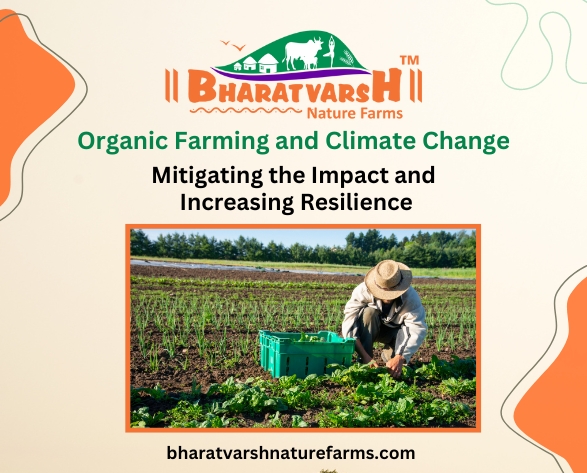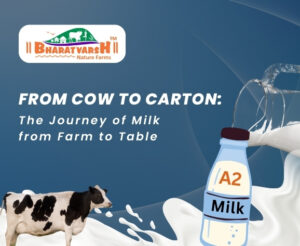In recent years, the urgency of addressing climate change has become increasingly apparent. As we face the consequences of environmental degradation and the need for sustainable solutions, organic farming has emerged as a powerful tool for mitigating the impact of climate change. By adopting organic practices, farmers can contribute to reducing greenhouse gas emissions, conserving natural resources, and increasing the resilience of agricultural systems.
This article explores the crucial relationship between organic farming and climate change, highlighting the strategies employed to mitigate its impact and foster agricultural resilience.
Organic Farming’s Contribution to Mitigating Climate Change:
As the global community grapples with the urgent need to address climate change, organic farming has emerged as a powerful ally in mitigating its impact. With its focus on sustainable practices and environmental stewardship, organic farming offers a promising solution to combat the challenges posed by a changing climate.
At Bharatvarsh Nature Farms in Nagpur, we follow several significant steps to fight against climate change. Firstly, we ensure to eliminate the use of synthetic fertilizers and pesticides, reducing greenhouse gas emissions associated with their production and application. Secondly, we prioritize soil health through techniques like cover cropping and composting, enhancing carbon sequestration in the soil. This helps to mitigate climate change by storing atmospheric carbon dioxide in the form of organic matter. Additionally, Bharatvarsh Nature Farms has incorporated agroforestry systems, which promote tree planting and increase carbon sequestration while providing additional ecological benefits.
Conserving Natural Resources:
Organic farming plays a crucial role in conserving vital natural resources. Conventional agriculture relies heavily on fossil fuels, contributing to carbon emissions. In contrast, organic practices emphasize energy efficiency, minimizing dependence on non-renewable resources. At our farm that’s more like nature’s home to us, organic farming is structured in such a way that great emphasis is applied on water conservation through practices like drip irrigation, mulching, and efficient water management. By reducing water usage, we strive to combat the effects of climate change, including droughts and water scarcity. We encourage you to visit our farm sometime to see how beautiful the world could be if created and nurtured consciously.
Enhancing Resilience:
Climate change poses numerous challenges to agricultural systems, including extreme weather events, pests, and diseases. Organic farming, with its focus on biodiversity and ecological balance, enhances the resilience of agroecosystems. At Bharatvarsh Nature Farms, we foster diverse habitats to attract beneficial insects, birds, and other wildlife that act as natural pest control agents. This reduces our reliance on synthetic pesticides, which can have detrimental environmental effects. Additionally, we follow organic farming practices that promote crop diversity, reducing the vulnerability of monocultures to climate-related risks. We use cover crops and crop rotation to enhance soil health, nutrient cycling, and water retention, contributing to a more resilient and adaptable agricultural system.
Organic Farming and Food Security:
As climate change disrupts traditional agricultural patterns, food security becomes a critical concern. Our farming offers a solution by promoting local and regional food systems. We supply fresh, nutritious produce while reducing their dependence on long-distance transportation and its associated carbon emissions. Additionally, we follow the preservation of traditional and heirloom seed varieties, which are often more resilient to changing climatic conditions. This helps to maintain agricultural biodiversity and secure organic supplies for future generations.
Conclusion:
In the face of climate change, organic farming emerges as a beacon of hope, offering practical and sustainable solutions. By prioritizing nature’s wisdom and adopting organic practices, farmers can play a vital role in mitigating the impact of climate change while building resilience in agricultural systems.
Bharatvarsh Nature Farms stands as a shining example of the power and potential of organic farming practices. Through our commitment to sustainable agriculture, we have demonstrated how harmonizing human activities with nature can create a positive impact on the environment, communities, and the future of farming.
We prioritize soil health, biodiversity conservation, and chemical input reduction. By eliminating synthetic fertilizers and pesticides, we have reduced the carbon footprint associated with conventional agriculture and fostered a healthier and more sustainable approach to farming.
Our dedication to preserving biodiversity and ecological balance has created habitats that support beneficial organisms, such as pollinators and natural predators, enhancing the overall health of the farm ecosystem. As part of our commitment to water conservation, drip irrigation and rainwater harvesting are used to optimize water usage and minimize waste. In addition to preserving precious water resources, we adapt to a changing climate by embracing efficient water management techniques.
Bharatvarsh Nature Farms’ commitment to organic farming extends beyond our own fields. Through community engagement and education initiatives, we actively promote the benefits of organic agriculture and inspire others to adopt sustainable farming practices. By fostering local food systems and supporting small-scale farmers, we contribute to food security and create a stronger, more resilient agricultural network.
We see ourselves as true trailblazers in the realm of organic farming practices. Our dedication to sustainability, environmental stewardship, and community involvement sets a remarkable example for the agricultural industry as a whole. Through our commitment to organic farming, we are paving the way for a future where farming and nature coexist in harmony, creating a healthier planet for generations to come.
Let us embrace the power of organic farming, recognizing its contribution to mitigating climate change and building a brighter future. By working in harmony with nature, we can create a world where agriculture thrives, ecosystems flourish, and future generations can enjoy the benefits of a resilient and sustainable planet. Organic farming is not just an agricultural practice; it is a pathway towards a more friendly and climate-conscious world that we can all be proud of.
Evolve to organic food habits – Contact Bharatvarsh Nature Farms
With acres of land dedicated to fruit and vegetable farming, Bharatvarsh Nature Farms uses organic farming practices to minimize environmental impacts. If you want to transform your food practices and inculcate organic food habits, Bharatvarsh Nature Farms can help you in the process. You can also get some useful gardening tips to grow your own organic garden. The farm also has services that deliver you a basket of organically grown fruits and vegetables every week. So, evolve organic food habits with Bharatvarsh Nature Farms.
Get in touch with us for any further information. Happy Healthy Eating!
For more details, please visit our website: https://bharatvarshnaturefarms.com/
Write to us at: info@bharatvarshnaturefarms.com
Call us at: 91-8603214214, 8650214214
Also Read: GROWING GREEN: THE BENEFITS AND TECHNIQUES OF ORGANIC FARMING IN 2023 – Bharatvarsh Nature Farms




